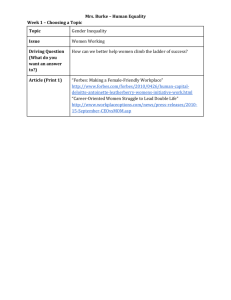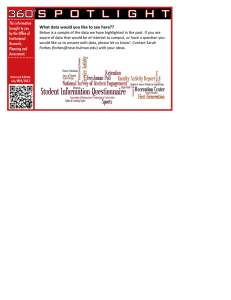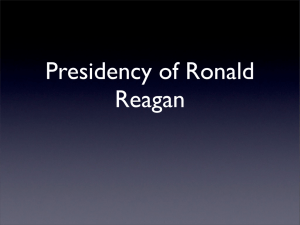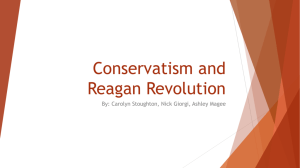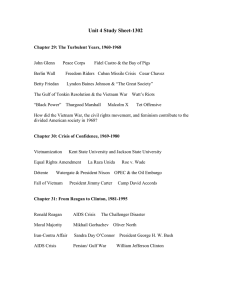Wall Street Journal Commentary One Simple Rate
advertisement
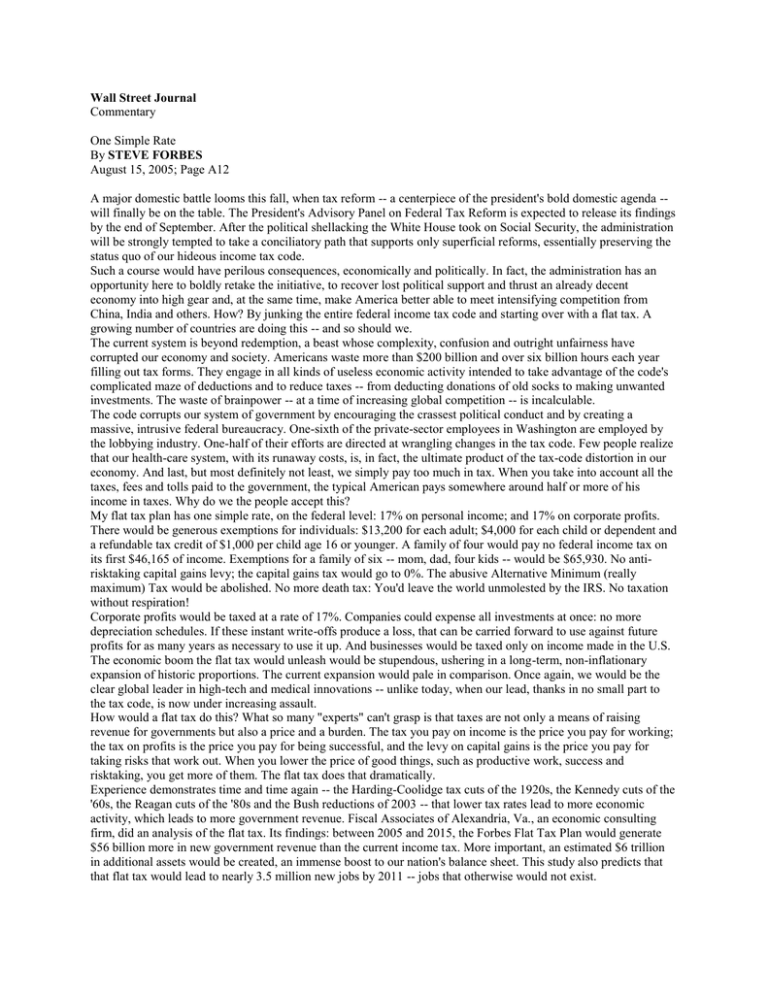
Wall Street Journal Commentary One Simple Rate By STEVE FORBES August 15, 2005; Page A12 A major domestic battle looms this fall, when tax reform -- a centerpiece of the president's bold domestic agenda -will finally be on the table. The President's Advisory Panel on Federal Tax Reform is expected to release its findings by the end of September. After the political shellacking the White House took on Social Security, the administration will be strongly tempted to take a conciliatory path that supports only superficial reforms, essentially preserving the status quo of our hideous income tax code. Such a course would have perilous consequences, economically and politically. In fact, the administration has an opportunity here to boldly retake the initiative, to recover lost political support and thrust an already decent economy into high gear and, at the same time, make America better able to meet intensifying competition from China, India and others. How? By junking the entire federal income tax code and starting over with a flat tax. A growing number of countries are doing this -- and so should we. The current system is beyond redemption, a beast whose complexity, confusion and outright unfairness have corrupted our economy and society. Americans waste more than $200 billion and over six billion hours each year filling out tax forms. They engage in all kinds of useless economic activity intended to take advantage of the code's complicated maze of deductions and to reduce taxes -- from deducting donations of old socks to making unwanted investments. The waste of brainpower -- at a time of increasing global competition -- is incalculable. The code corrupts our system of government by encouraging the crassest political conduct and by creating a massive, intrusive federal bureaucracy. One-sixth of the private-sector employees in Washington are employed by the lobbying industry. One-half of their efforts are directed at wrangling changes in the tax code. Few people realize that our health-care system, with its runaway costs, is, in fact, the ultimate product of the tax-code distortion in our economy. And last, but most definitely not least, we simply pay too much in tax. When you take into account all the taxes, fees and tolls paid to the government, the typical American pays somewhere around half or more of his income in taxes. Why do we the people accept this? My flat tax plan has one simple rate, on the federal level: 17% on personal income; and 17% on corporate profits. There would be generous exemptions for individuals: $13,200 for each adult; $4,000 for each child or dependent and a refundable tax credit of $1,000 per child age 16 or younger. A family of four would pay no federal income tax on its first $46,165 of income. Exemptions for a family of six -- mom, dad, four kids -- would be $65,930. No antirisktaking capital gains levy; the capital gains tax would go to 0%. The abusive Alternative Minimum (really maximum) Tax would be abolished. No more death tax: You'd leave the world unmolested by the IRS. No taxation without respiration! Corporate profits would be taxed at a rate of 17%. Companies could expense all investments at once: no more depreciation schedules. If these instant write-offs produce a loss, that can be carried forward to use against future profits for as many years as necessary to use it up. And businesses would be taxed only on income made in the U.S. The economic boom the flat tax would unleash would be stupendous, ushering in a long-term, non-inflationary expansion of historic proportions. The current expansion would pale in comparison. Once again, we would be the clear global leader in high-tech and medical innovations -- unlike today, when our lead, thanks in no small part to the tax code, is now under increasing assault. How would a flat tax do this? What so many "experts" can't grasp is that taxes are not only a means of raising revenue for governments but also a price and a burden. The tax you pay on income is the price you pay for working; the tax on profits is the price you pay for being successful, and the levy on capital gains is the price you pay for taking risks that work out. When you lower the price of good things, such as productive work, success and risktaking, you get more of them. The flat tax does that dramatically. Experience demonstrates time and time again -- the Harding-Coolidge tax cuts of the 1920s, the Kennedy cuts of the '60s, the Reagan cuts of the '80s and the Bush reductions of 2003 -- that lower tax rates lead to more economic activity, which leads to more government revenue. Fiscal Associates of Alexandria, Va., an economic consulting firm, did an analysis of the flat tax. Its findings: between 2005 and 2015, the Forbes Flat Tax Plan would generate $56 billion more in new government revenue than the current income tax. More important, an estimated $6 trillion in additional assets would be created, an immense boost to our nation's balance sheet. This study also predicts that that flat tax would lead to nearly 3.5 million new jobs by 2011 -- jobs that otherwise would not exist. To avoid puerile and divisive debate about who would gain and who would lose, my flat tax is designed to be a tax cut for all. Because some people will only focus on what they lose in the way of deductions under the flat tax -ignoring the fact that their income tax payments would go down -- my plan gives you a choice: When the flat tax is implemented, you can file your postcard return under this new, simple system, or continue to file your tax returns, with all of their mind-numbing complexity, under the old system. See for yourself which is better. I think most would conclude that the flat tax is best. Other countries are getting the message, even if we have yet to. Hong Kong has successfully had a variation of the flat tax for 60 years. Lithuania, Latvia and Estonia enacted flat taxes in the '90s that have been hugely successful. Russia put in a flat tax four years ago, and revenues have more than doubled in real terms. Ukraine, Slovakia, Romania, Georgia and Serbia have also successfully enacted flat taxes. How ironic that one-time Communist nations have been reaping the benefits of a flat tax before that bastion of free enterprise, the U.S. President Bush should understand that trying to tinker with the tax beast won't work. In 1986, Ronald Reagan simplified the tax code somewhat: A number of tax shelters were eliminated and the number of tax brackets were cut to two: 28% and 15%. But the code remained intact. No sooner was the ink of Reagan's signature dry than Washington politicians slid back into their bad, old habits. Since his day, the federal income tax code has been amended 14,000 times. The tax system today is 60% larger than it was after the Reagan reforms. The flat tax's very simplicity makes such backsliding difficult: Any change would trigger a national debate. For insurance, the Forbes Flat Tax also contains a supermajority provision -- taxes can't be raised unless approved by a 60% vote in both the House and Senate. Few tax boosts in recent decades have surmounted such a barrier. The usual objections to the flat tax don't hold up. The flat tax will help housing -- personal incomes would go up and interest rates would go down - and boost charitable giving. Experience demonstrates that when people earn more they give more. *** What about a national retail sales tax? The most prominent plan encompassing this idea proposes a sales tax of 30% to replace the income tax and payroll tax. This 30% tax poses many challenges, among them repealing the 16th Amendment, which allows Washington to impose the income tax -- a lengthy, onerous process. Otherwise, we would likely end up with both an income tax and a sales tax. The national sales tax would dramatically raise prices of many goods and services. Imagine a couple buying a new house costing, say, $200,000, coughing up an extra $60,000 in sales taxes. A new dedicated bureaucracy would be necessary to collect the tax and to disburse rebates (which the plan's advocates propose) from Uncle Sam to tens of millions of Americans every month to repay them for a portion of the sales tax they pay on food and clothing. Under the circumstances, the flat tax seems the best alternative to the current abomination. That's why George Bush should pull a Ronald Reagan -- he should demand that Congress destroy this hideous tax system, the way Reagan demanded that Mikhail Gorbachev tear down the Berlin Wall. Should the president make such a plea, the American people would surprise the Washington cynics and give him a grateful, full-throated cry of support. Mr. Forbes, editor in chief of Forbes Magazine and president & CEO of Forbes Inc., is the author of "Flat Tax Revolution: Using a Postcard to Abolish the IRS" (Regnery, 2005).
